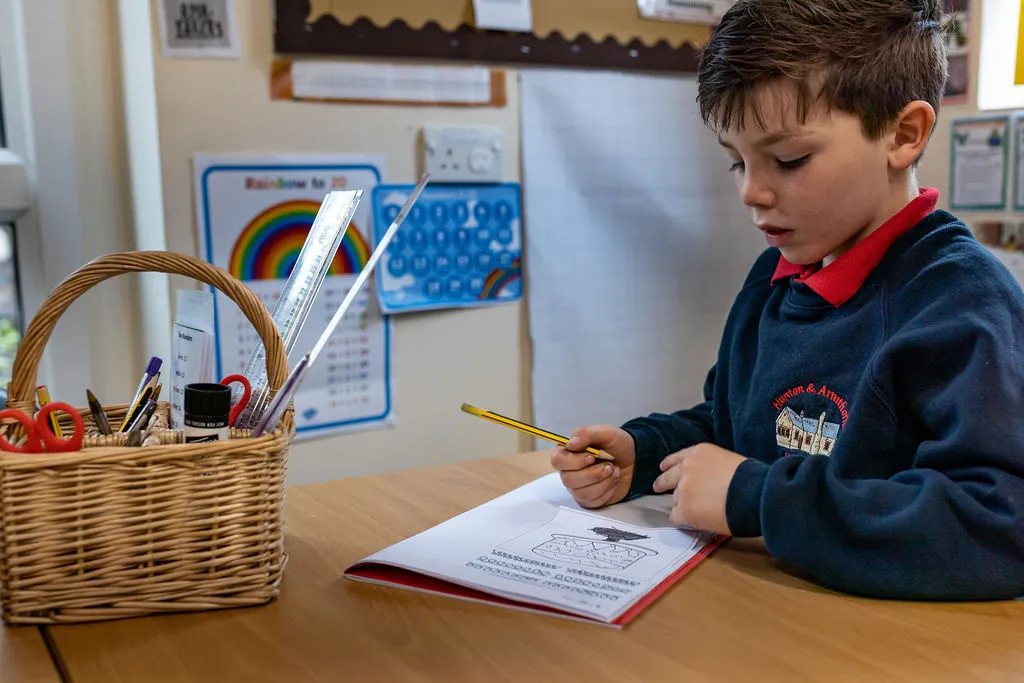The 2014 National Curriculum for Maths aims to ensure that all children:
• Become fluent in the fundamentals of Mathematics
• Are able to reason mathematically
• Can solve problems by applying their Mathematics
At Hunton and Arrathorne, these skills are embedded within Maths lessons and developed consistently over time. We are committed to ensuring that children are able to recognise the importance of Maths in the wider world and that they are also able to use their mathematical skills and knowledge confidently in their lives in a range of different contexts. We want all children to enjoy Mathematics and to experience success in the subject, with the ability to reason mathematically. We are committed to developing children’s curiosity about the subject and supporting them through innovative teaching styles, accompanied by rich resources and cross-curricular links.
We have bespoke calculation policies for both written and mental calculations which demonstrate what progress looks like across school. These calculation policies have been designed with our children in mind and are in fully in line with the National Curriculum (White Rose Calculation Policy 2024). As a basis for our learning we have developed our own bespoke long-term plan to suit the needs of our children – this influenced by White Rose and the NCETM. Teachers use the White Rose Small Steps to help devise a unit overview which helps ensure that the children are taught maths in a progressive way. Teachers use these planning tools to develop lessons which further children’s understanding of mathematical fluency, varied fluency and problem solving. They also ensure plenty of time is dedicated to ensuring the children have the opportunity to ‘deep practice’ their mathematical skills. Teachers draw upon a range of resources to support their planning and ensure pupils are exposed to a varied diet of mathematics – these include resources from the NCETM and White Rose. This approach is further developed through our involvement in the Maths Hubs ‘Teaching for Mastery’ programme.
Within a unit of work, or objective, children are given an opportunity to deepen their understanding including the ‘concrete, pictorial and abstract’ approaches to ensure that children have a solid understanding of the skills and concepts taught. We expect that over the course of a National Curriculum objective, children will develop their fluency, be exposed to varied fluency and have the opportunity to reason and problem solve. This may be during the course of one lesson, or over several lessons.
Mental and written calculations, as well as counting skills, are taught through the National Curriculum mathematics lessons. Counting is a key part of every maths lesson: each lesson begins with an active counting activity. Children are encouraged to retrieve and recall information through a retrieval activity in every lesson. Teachers may draw upon the ‘Flashback 4’ resources as a means of providing the children with varied fluency
opportunities, but the focus should be on active learning opportunities based on assessment for learning.
‘The Diamond Dash’ is a key part of Mathematics within our school – it is a programme designed to accelerate children’s fluency in multiplication and division facts. Children take part in the ‘Diamond Dash’ from Reception where it starts with oral counting, through to the end of Key Stage 2, with a range of multiplication, division, square numbers, cube numbers, square roots and decimals. Ten minutes of each day are allocated to this.
Alongside planning and progression documents, to aid teacher’s in their delivery of mathematics lessons, the policy ensures consistency for our children in terms of work-books, learning environments and lesson structure.
The Mathematicians subject leader is Sam Donaldson.
For further information about our Mathematics curriculum, please click the link below.
